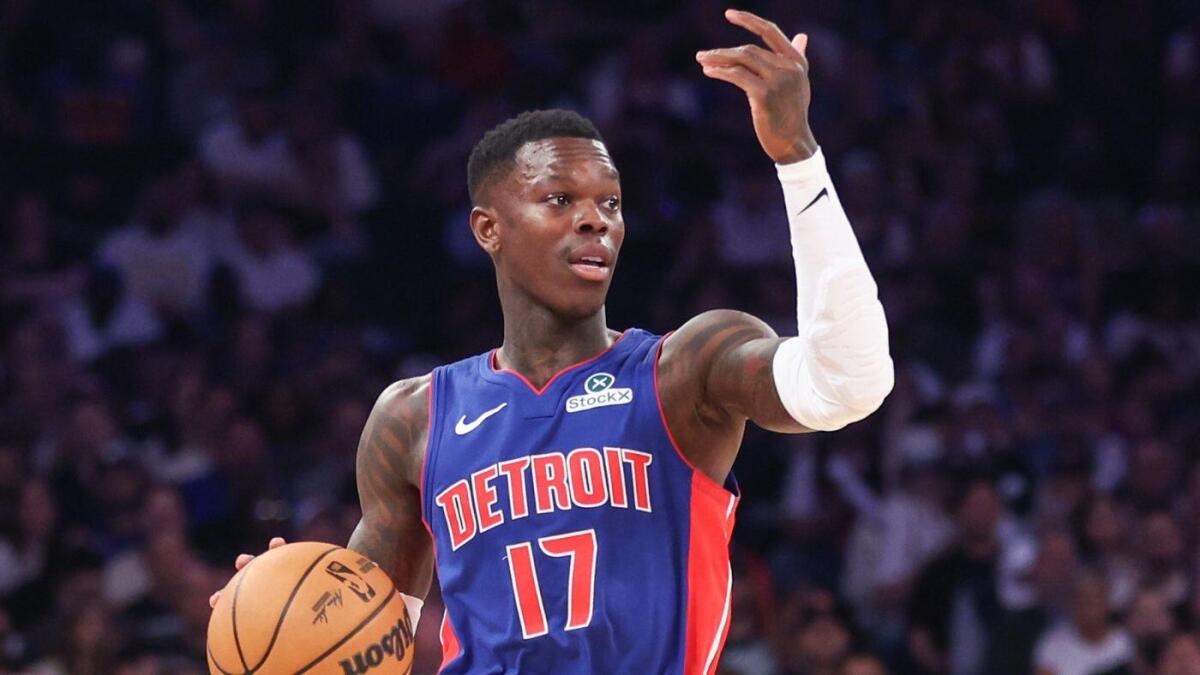Dennis Schröder’s free agency and future with the Detroit Pistons have become a focal point in NBA discussions, given his recent public statements and the franchise’s ambiguous stance on re-signing him. This situation highlights a complex dynamic involving Schröder’s desire for stability, the Pistons’ roster strategy, and the broader market context as the 2025 NBA free agency period approaches.
Schröder’s Journey to the Pistons and Performance
Dennis Schröder, an experienced point guard known for his speed, playmaking, and scoring ability, joined the Detroit Pistons via a mid-season trade from the Golden State Warriors. Prior to this, Schröder had been involved in multiple trades during the 2024-25 season, including stops with the Utah Jazz and a brief stint with the Warriors. His acquisition by Detroit was seen as a move to bolster veteran depth and add playoff experience to a young Pistons roster featuring Cade Cunningham and Jaden Ivey in the backcourt.
During his 28 games with Detroit, Schröder showcased a strong impact, averaging 10.8 points and providing crucial leadership on the floor. His timely shooting and play in clutch moments increased his value for the team, making him a key contributor in the Pistons’ playoff push. This performance hinted that maintaining continuity with Schröder could benefit Detroit as they continue developing their young talent.
Schröder’s Public Statements: A Mix of Optimism and Frustration
Despite his on-court contributions, Schröder’s recent messages paint a picture of uncertainty and subtle frustration. Through Instagram and other social media posts, he has expressed his desire to remain in Detroit, saying explicitly, “I want to stay in Detroit for sure.” However, he concurrently noted, “Detroit ain’t waiting for me,” implying a perceived lack of urgency or commitment from the Pistons’ front office to secure his return.
This sentiment was further amplified in a candid public rant where Schröder called out the Pistons’ management for stalling or dragging contract discussions. His statements suggest that while he values the fit and camaraderie in Detroit, he is prepared to explore other opportunities in free agency given the unclear stance of the franchise.
Pistons’ Front Office and Roster Considerations
From the Pistons’ perspective, the approach to Schröder’s free agency is multifaceted. Detroit has a young core that they are building around, with Cunningham and Ivey anchoring their backcourt for the future. As such, Schröder, at 31 years old, fits more as a veteran role player rather than a long-term cornerstone.
Insiders report that the Pistons have shown some interest in re-signing Schröder but are cautious given salary cap considerations and roster flexibility needs. With multiple players, including Tim Hardaway Jr. and Malik Beasley, also in play this free agency, Detroit must allocate resources carefully. This highlights why contract negotiations have been slow and tentative.
Furthermore, some reports indicate that Detroit may view Schröder more as a short-term option or “Plan B” in free agency rather than a priority re-sign. The Pistons appear to be considering alternative backcourt depth options, potentially signifying a pivot in their long-term direction that may not include Schröder.
The Free Agent Market and Schröder’s Options
Schröder will enter a free agency market where his skill set remains in demand for teams seeking experienced point guard depth. Several teams, including the Sacramento Kings and potentially others like the New York Knicks, have shown interest in him as they look to strengthen their backcourts.
The Kings, in particular, have emerged as potential “leading suitors,” attracted by Schröder’s playmaking and playoff composure. His ability to adapt to various systems and bring veteran savvy makes him a valuable commodity for teams pushing for postseason success or looking for steady leadership.
Given Detroit’s indecision and the interest from other franchises, Schröder faces a choice: pursue stability and a possibly lesser role elsewhere or gamble on uncertain negotiations to remain with the Pistons, where he has found some level of fit.
Potential Impact on Pistons’ Strategy and Team Chemistry
If Schröder departs, Detroit will lose a reliable veteran presence who has helped mentor Cunningham and Ivey. His departure could necessitate finding a comparable veteran leader, either through free agency or trade. Alternatively, the Pistons could accelerate the development of younger guards, but this carries risks in terms of consistency and experience in high-stakes moments.
Conversely, retaining Schröder—even on a potentially reduced or shorter-term deal—could provide continuity and a balance of youth and experience on the roster, aiding the team’s competitive aspirations in the near term.
Conclusion: Schröder’s Crossroad and the Pistons’ Decision
Dennis Schröder stands at a professional crossroad shaped by his aspirations for stability and the Pistons’ strategic deliberations. His public expressions underscore a player eager to stay but unwilling to wait indefinitely for a commitment that may never come. Meanwhile, Detroit wrestles with balancing veteran inputs against their commitment to youth and fiscal prudence.
The outcome of this situation will significantly shape the Pistons’ backcourt composition in the 2025-26 season and influence Schröder’s career trajectory. Whether Schröder finds a renewed home in Detroit or embarks on a new opportunity, his journey serves as a telling example of the delicate interplay between player desires, team strategies, and the high-stakes world of NBA free agency.











